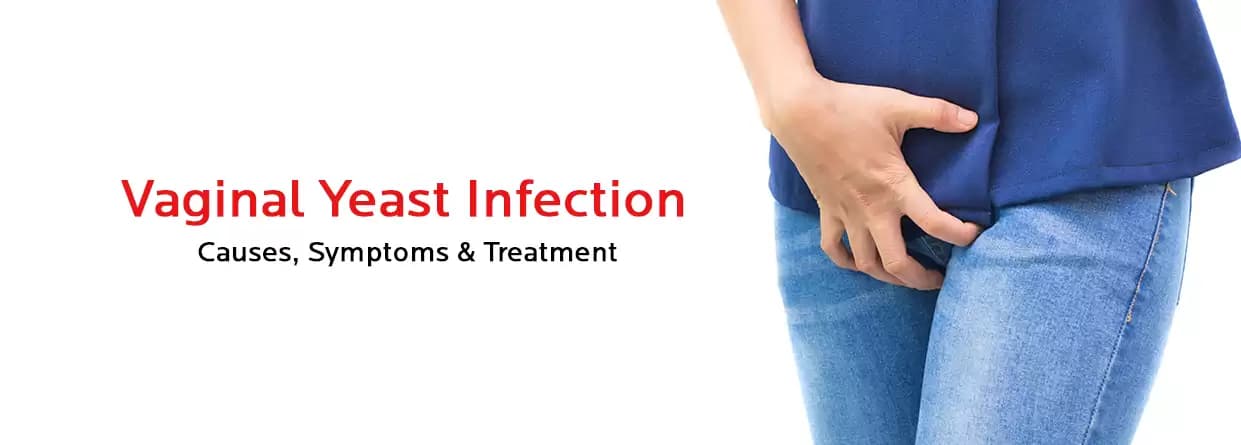
A vaginal yeast infection is a condition caused by fungi leading to irritation, vaginal discharge, and severe itchiness in the vagina and vulva.
Have you ever experienced a vaginal yeast infection? If yes, then certainly you might be aware that it is a fungal infection type. Your body has a type of yeast known as candida causing these kinds of infections. Yeast is a kind of fungus and candida is a particular yeast type. There are no issues when there is a yeast balance within your body. However, when this balance is interrupted, it begins to develop fast which means a yeast infection.
Options are there for vaginal yeast infection treatment like antifungal medication which we will include in the write-up further. Other than treatment, you will also find the comprehensive discussion on its symptoms, causes, and diagnosis below. Please note that this blog is for informative purposes and is entirely research-based. We do not interfere with the consultation of a healthcare professional.You can book your appointment with the best gynecologist in Kolkata at one of the best multispecialty hospitals, The Calcutta Medical Research Institute, which offers the most exceptional patient care and healthcare services.
A vaginal yeast infection is a condition caused by fungi leading to irritation, vaginal discharge, and severe itchiness in the vagina and vulva. The vulva and vagina are the tissues in the opening of the vagina.
Vaginal yeast infection also known as vaginal candidiasis affects around three out of four females once in their life. According to a study, it is found that most females experience around two episodes of vaginal yeast infection. It is not known as a sexually transmitted infection but there is an enhanced risk of vaginal yeast infection in the initial activity of sexual activity.
Researchers have also discovered some evidence related to vaginal infection which suggests that it might be interlinked with mouth-to-genital contact as well. There are medications that help in treating vaginal yeast infections. There might be a requirement for longer treatment if you have recently experienced recurrent episodes of vaginal yeast infections.
Vaginal yeast infection symptoms vary from mild to moderate or moderate to severe. Here are some of the common usually experienced by females:
One of the primary vaginal yeast infections causes is fungus candida albicans. Your vagina has a balanced mix of yeast, bacteria, and candida. There is a bacteria named Lactobacillus that helps to avert yeast production. However, the balance can be interrupted. If there is a development of candida or fungus penetration into the layers of the deep vaginal area, then it leads to yeast infections. Some vaginal yeast infection reasons are there that can cause complications. Here are some of the causes of vaginal yeast infections:
A vaginal yeast infection diagnosis initiated by a healthcare professional is followed by including some tests. After knowing the patient and their symptoms, here is how the doctor will confirm the yeast infection diagnosis:
Vaginal yeast infection treatment entirely relies on the seriousness and your infection's frequency. Here are the treatment options for cases that are mild to moderate:
It is recommended to get in touch with a doctor if the condition is not resolved within a month or two. If your condition is serious, then here are the treatment options for vaginal yeast infections:
Vaginal yeast infections are a common condition that might occur in females. With immediate treatment options, it can be treated early. The doctor might recommend medications and you might notice symptoms going away within a few days. You must be aware of the risk factor as it can help you avert infections in the future. Make sure to consult your doctor if you experience recurrent yeast infections lasting more than two months.
The fastest and quicker way to get rid of vaginal yeast infection is by visiting a doctor and understanding your treatment options. Make sure to take the medications as recommended by your doctor.
For the treatment of vaginal yeast infection, your doctor might recommend antifungal medications including creams and ointments to relieve the symptoms.
Lactobacillus rhamnosus is the best supplement to get rid of the yeast infections.
Written and Verified by:

Dr. Samir Kr Ray is a Consultant in Obstetrics & Gynaecology Dept. at CMRI, Kolkata with over 32 years of experience. He specializes in endoscopic surgery and advanced gynaecological endoscopy
Similar Obstetrics and Gynaecology Blogs
Book Your Appointment TODAY
© 2024 CMRI Kolkata. All Rights Reserved.